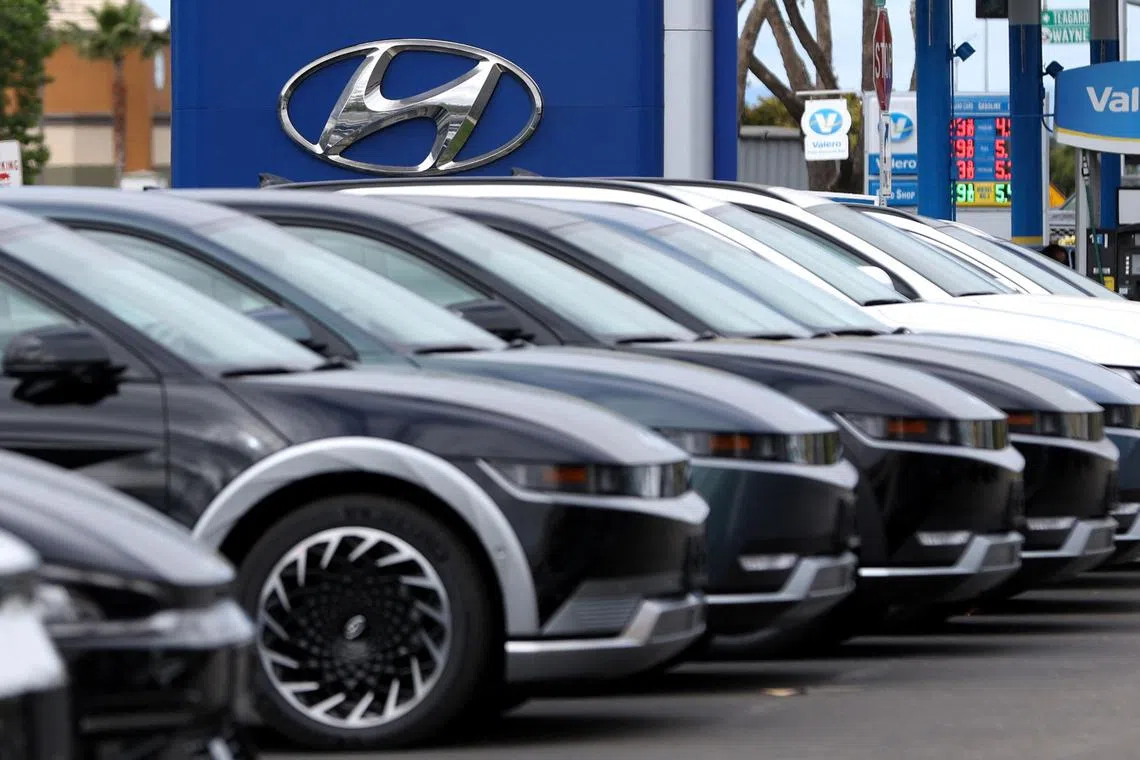Hyundai faces new pressure campaign from US labour groups over new EV plant
Sign up now: Get ST's newsletters delivered to your inbox

The groups are pressuring Hyundai to do more to ensure safe labour conditions throughout its supply chain.
PHOTO: AFP
Follow topic:
WASHINGTON – Hyundai Motor Company is facing a pressure campaign from a coalition of labour groups and civil rights groups in Alabama and Georgia, the home of its new US$5.5 billion (S$7.5 billion) electric vehicle assembly and battery complex.
The coalition is asking Hyundai to negotiate a community benefits agreement that will “enshrine high-road commitments to workers and their communities in an enforceable agreement”, according to a letter dated on Sunday addressed to the Korean automaker and signed by the Alabama Coalition for Community Benefits and the Georgia branch of the AFL-CIO, a US federation of labour unions.
The groups are pressuring Hyundai to do more to ensure safe labour conditions throughout its supply chain after a Department of Labour investigation in 2022 uncovered child labour violations at several Alabama companies supplying the Korean automaker. Hyundai is investing US$5.5 billion to build an electric vehicle (EV) assembly and battery plant near the port city of Savannah, Georgia, that will create 8,100 new jobs. It also employs about 3,000 people at an assembly plant in Montgomery, Alabama.
“Our top priority is the safety and well-being of the more than 114,000 individuals we employ, directly and indirectly, whose market-leading skills and expertise are driving America’s auto industry forward,” the company said in an e-mailed statement in response to the letter.
Hyundai and Kia have been notching sales records in the US with sport utility vehicles like the Kia Telluride and Hyundai Santa Fe. Hyundai has been racing to build the new EV plant in Georgia so it can qualify for consumer EV tax credits under the Inflation Reduction Act, which made domestic assembly a prerequisite for the tax breaks.
For US President Joe Biden, the Hyundai campaign has political ramifications, in setting specific demands on one of the largest automakers in the world in one of the most important swing states in the 2024 presidential election, Georgia.
“The people in the community should be able to come to work in these plants, with a liveable wage and good jobs,” said Ms Yvonne T. Brooks, president of the Georgia state AFL-CIO, adding that “to bring jobs here but not provide a liveable wage kind of defeats the purpose”.
Mr Biden has campaigned on the sheer number of jobs created by his three signature laws, a US$1 trillion (S$1.36 trillion) infrastructure package, a US$280 billion measure to rekindle a domestic semiconductor industry, and the Inflation Reduction Act, which included US$370 billion for clean energy to combat climate change. A US$25 million advertising blitz announced by his campaign last week kicked off with a one-minute spot that proclaims “Manufacturing jobs are coming home”, and “America is leading the world in clean energy”.
But despite low unemployment, tempering inflation and steady job creation, Mr Biden’s overall approval ratings have been dragged down by voters’ refusal to give him credit for the good economic news. Dr Clifford Young, who oversees US public opinion research at Ipsos, a polling company, said that 2022’s 8.5 per cent inflation and the ensuing interest rate increases and slower economic growth might have sealed Mr Biden’s fate with the voting public.
“The dirty secret is a bad economy hurts a president more than a good economy helps,” he said.
White House officials, who were notified of the Hyundai effort ahead of time, said last Thursday that Mr Biden fully backs the aims of the coalition in Georgia. And labour leaders have generally supported Mr Biden as the most pro-union president ever.
But in a notable shift, those leaders also say the volume of jobs created on his watch might not be enough to win worker loyalties if those jobs are low-paid, dangerous and insecure. That is especially true if substandard jobs are underwritten by the taxpayer.
“I know the President can’t make stipulations that all new jobs have to go to union workers, but there have to be fair labour standards for jobs that are supported by tax dollars,” said Mr David Green, the United Automobile Workers’ regional director for Ohio and Indiana. “Members are a little frustrated with it. It’s our tax dollars, too.” BLOOMBERG, NYTIMES

